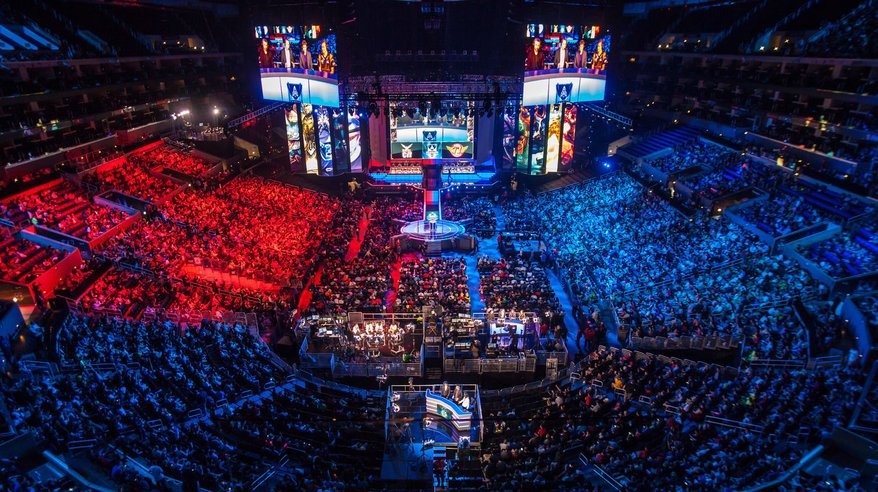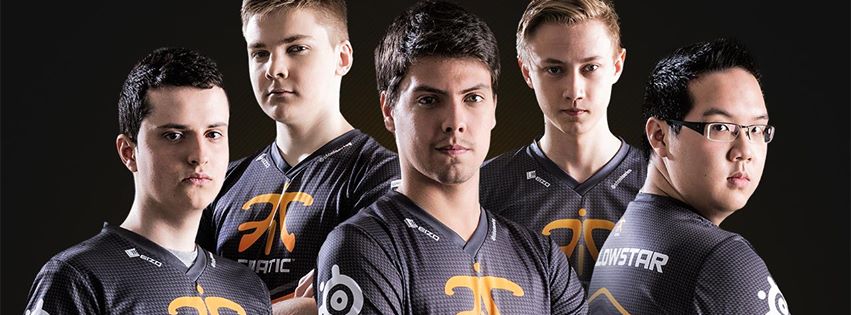As fall football fervor sweeps America, a revolution in digital sports is drawing international attention. The world of e-sports, or online competitive gaming, has become an extremely lucrative industry within the last decade that may one day rival traditional, physical sports. E-sports have attained all the hallmarks of a professional sports organization: a managing company, a network of international professionals, a robust fan base, and live competitions that fill stadiums. This has led even traditional sporting icons like ESPN to report on major tournaments and the U.S. government to recognize certain games as professional sports. E-sports are not only proving their worth, but they are paving the way for a wealth of new opportunities in the sports industry.
E-sports began in the mid-2000s, when multi-player, free-to-play games like “League of Legends” (LoL) and “Defense of the Ancients” (DOTA) were released. These games emerged at a time when teens and young adults had more access to the Internet than any previous generation. E-sports first became a phenomenon in South Korea when the game “StarCraft” hosted and broadcast competitions with thousands of players in attendance cheering on their favorite teams. Since then, the popularity of e-sports and competitions has spread to a number of other countries, especially in Western Europe and the United States.
Anyone who has been to a “League of Legends” live competition can attest to its grandeur. Teams of dedicated players gather to battle each other on giant screens while passionate fans cheer; whoever wins gets a massive cash prize, sometimes over $1million. As Riot Games, the Los Angeles-based parent company of LoL boasts, the 2014 world championship competition was watched cumulatively online for 70 million hours.
“Professional players on these teams compete to win cash prizes offered at gaming competition and some live lavish lifestyles in mansions owned by their sponsors.”
What is notable about the e-gaming industry is the sheer size of some professional organizations. Riot Games espouses the principle that “Revenue is second, the player experience is first;” by focusing on player-oriented content, the company has snowballed into a multi-million dollar affair—last year the company earned $946 million in revenue. Riot Games directly employs hundreds of workers at its headquarters to handle its massive clientele. Its researchers focus on the market to make sure Riot Games remains “player-focused;” analysts study the gaming community; business developers seek to expand the company’s reach even farther. What’s more, the company has created strategic global partnerships to promote the game on other continents. It’s showing no signs of slowing its growth, and is expected to reach one billion dollars in revenue for the 2015 fiscal year.
The world of e-sports also provides lucrative career opportunities for players who gain a popular following. Players who attain high rankings in LoL matches are sometimes invited to play on professional teams sponsored by businesses like Geico, Samsung, and HTC, and may even earn private sponsorships themselves. Professional players on these teams compete to win cash prizes offered at gaming competition and some live lavish lifestyles in mansions owned by their sponsors. It is common for players to stream videos of themselves playing on websites like Twitch where they can earn thousands of dollars every week from advertisements, streaming subscriptions and donations. Some players earn enough money to turn gaming into a full-time career, like Spanish player Carlos “ocelote” Rodriguez, who earns close to one million dollars per year.
The fan base of LoL is not only large, but has a strong sense of community and culture. At yearly competitions, fans have the opportunity to connect with like-minded people from other places and lifestyles and to visualize the scope of the international gaming community. Many players find their sense of community online. LoL’s website has an archive of forums where players from across the world meet to discuss exciting game upgrades and tips on how to improve your skills. Reddit’s LoL forum has a subscription list of over 750,000 users who share posts ranging from gaming videos to inspirational words, with thousands of comments on certain threads. Youtube is filled with interviews of popular players who have gained an almost cult-like following, relatable to what can be seen with famous football players.
“Most importantly, it is an equalist mode of competition: anyone with a computer and an Internet connection can participate, even on a professional level.”
While the popularity of e-sports is undeniable, some doubt that e-sports will ever reach the cultural entrenchment that sports like football and soccer have attained. However, e-sports should not be underestimated, as they may have succeeded in filling a niche that has been left unfulfilled by traditional sports. The online aspect of e-sports appeals to millennials. It’s non-physical characteristic appeals to those who enjoy competition but are not interested in physical sports. It combines the intrigue of digital fantasy with a sense of community. Most importantly, it is an equalist mode of competition: anyone with a computer and an Internet connection can participate, even on a professional level. If the unprecedented growth of the industry within the last five years is any indication, e-sports will likely continue to fill this niche.
The explosive growth of digital sports within the last decade is a fascinating development that has provided a wealth of opportunities for those involved. The online aspect of e-sports has transformed what used to be a hobby into an international community of passion and professionalism and has shocked traditional sports genres with its popularity. It has quickly and steadily carved out its position in the sports world, and is likely to broaden its influence further—maybe one day becoming a household name as competitive and lucrative as football today.

